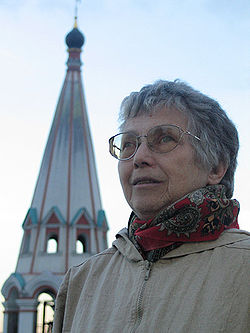- Natalya Gorbanevskaya
-
Natalya Yevgenyevna Gorbanevskaya (Russian: Ната́лья Евге́ньевна Горбане́вская, Polish: Natalia Gorbaniewska; ; born May 26, 1936 in Moscow) is a Russian poet, translator of Polish literature and civil rights activist. She is also a citizen of Poland.
Contents
Life
Gorbanevskaya graduated from Leningrad University in 1964 and became a technical editor and translator. Only nine of her poems have been published in official journals, the remainder being privately circulated or published abroad.
Gorbanevskaya was active in what later came to be called the Soviet "dissident movement." She and Liudmila Alexeyeva began publishing the Chronicle of Current Events, a samizdat publication that focused on human rights in the Soviet Union.[1] Gorbanevskaya was also one of eight protesters to demonstrate in Red Square on 25 August 1968 against the Soviet invasion of Czechoslovakia (see 1968 Red Square demonstration). Having recently given birth she was not immediately tried with the other demonstrators. She used this time to publicly follow the trial in the Chronicle of Current Events, and later published the related documents as the collection Noon (published abroad as Red Square at Noon). However, she was arrested in December, 1969 and imprisoned in a Soviet psychiatric prison until February, 1972.[2]
In December, 1975, Gorbanevskaya emigrated, and now lives in Paris.
Joan Baez released a song dedicated to Gorbanevskaya called "Natalia", with lyrics by Shusha Guppy, on the live album From Every Stage (1976). Introducing the song, Baez criticized Gorbanevskaya's internment in the psychiatric hospital and said: "It is because of people like Natalya Gorbanevskaya, I am convinced, that you and I are still alive and walking around on the face of the earth."[3]
In 2005 Gorbanevskaya participated in "They Chose Freedom", a four-part television documentary on the history of the Soviet dissident movement.
In 2008, October, Gorbanevskaya received the Award of Marie Curie.[4][5][6][7]
The same year, Gorbanevskaya was scheduled for the Angelus Central European Literature Award.[8]
She is a signatory of the Prague Declaration on European Conscience and Communism.[9]
Books and other publications
Gorbanevskaya, Natalya, Poems, Carcanet Press, 1972, ISBN 0-85635-002-8
See also
References
- ^ Liudmila Alexeyeva and Paul Goldberg, "The Thaw Generation: Coming of Age in the Post-Stalin Era (Pittsburg: University of Pittsburg Press, 1993).
- ^ «Хроника текущих событий», Выпуск 24 (in Russian).
- ^ Joan Baez, From Every Stage (A&M: 1976)Rob Horning, "Joan Baez: The Complete A&M Recordings," Popmatters.com http://www.popmatters.com/music/reviews/b/baezjoan-completeam.shtml
- ^ "AKoss-Dyb. Natalia Gorbaniewska uhonorowana przez UMCS" (in Polish). Radio Lublin. 2008-10-24. http://www.radio.lublin.pl/index.php?site=news_details&id=46717. Retrieved 2009-02-22.
- ^ "Lublin: Doktorat honoris causa UMCS dla Natalii Gorbaniewskiej" (in Polish). Dziennik Wschodni. 2008-10-24. http://www.dziennikwschodni.pl/apps/pbcs.dll/article?AID=/20081024/AKTUALNOSCI/63720226. Retrieved 2009-02-22.
- ^ "Natalia Gorbaniewska doktorem honorowym UMCS" (in Polish). Gazeta Wyborcza. 2008-10-24. http://wyborcza.pl/1,91446,5846082,Natalia_Gorbaniewska_doktorem_honorowym_UMCS.html. Retrieved 2009-02-22.
- ^ "Natalia Gorbaniewska doktorem honorowym UMCS" (in Polish). Wirtualna Polska. 2008-10-24. http://ksiazki.wp.pl/wiadomosci/id,37190,wiadomosc.html. Retrieved 2009-02-22.
- ^ Zamojski, Marcin; Dominika Chojnacka (translator) (2008-10-23). "Angelus Central European Literature Award". News.poland.com. http://news.poland.com/result/news/id/1223. Retrieved 2009-02-22.
- ^ "Prague Declaration: Selected signatories". Institute for Information on the Crimes of Communism. http://praguedeclaration.org/vipsig. Retrieved 2011-05-10.
External links
Links in English
- http://www.poetrymagazines.org.uk/magazine/record.asp?id=13151 Y.Kublanovsky. Natalya Gorbanevskaya, New Series No. 20 - 2002; (English translation from a review, published in Novy Mir, No.7, 1997, p.67-68).
- http://www.arlindo-correia.com/060804.html Poems, with translations into English
- http://links.jstor.org/sici?sici=0003-0554(197612)70%3A4%3C1335%3ARSAN%3E2.0.CO%3B2-F Red Square at Noon by Harrison E. Harrison, Natalia Gorbanevskaya. The American Political Science Review, Vol. 70, No. 4 (Dec., 1976), pp. 1335-1336 doi:10.2307/1959448
Links in Russian
- http://www.newkamera.de/gor_0*.html , *
 {1, 2, 3, 4, 5}, for ex.,
{1, 2, 3, 4, 5}, for ex., - http://www.newkamera.de/gor_02.html bibliography
- http://www.vavilon.ru/texts/gorbanevsk/ Biography and bibliography
- http://www.rvb.ru/np/publication/01text/02/11gorbanev.htm , links
- http://magazines.russ.ru/authors/g/gorbanevskaya/ Biography and bibliography
- http://www.newkamera.de/gor_01.html N.Gorbanevskaya. 6 циклов восьмистиший.
- http://www.poesis.ru/poeti-poezia/gorbanevskaja/biblio.htm bibliography
- http://www.rvb.ru/np/publication/02comm/02/11gorbanev.htm List of publications
- http://gallery.vavilon.ru/people/g/gorbanevskaya/ Photographs and biography
- http://www.goldref.ru/biography/Gorbanevskaja_N.E./1/ Биография
- http://www.hro.org/editions/karta/nr21/demonstr.htm Наталья Горбаневская. Что помню я о демонстрации
- http://www.memo.ru/history/DISS/chr/chr3.htm Информация о демонстрации в бюллетене «Хроника текущих событий»
- http://www.memo.ru/history/DISS/chr/chr4.htm Информация о суде над демонстрантами в бюллетене «Хроника текущих событий»
- http://www.yale.edu/annals/sakharov/documents_frames/Sakharov_008.htm; Письмо Андропова в ЦК про демонстрацию (windows encoding)
- http://ng68.livejournal.com/ Blog of Gorbanevskaya at Livejournal
Categories:- Russian poets
- Soviet poets
- Soviet dissidents
- Russian activists
- 1936 births
- Living people
- Russian women writers
- Soviet women writers
- Russian translators
- Soviet translators
- Soviet emigrants to France
Wikimedia Foundation. 2010.


